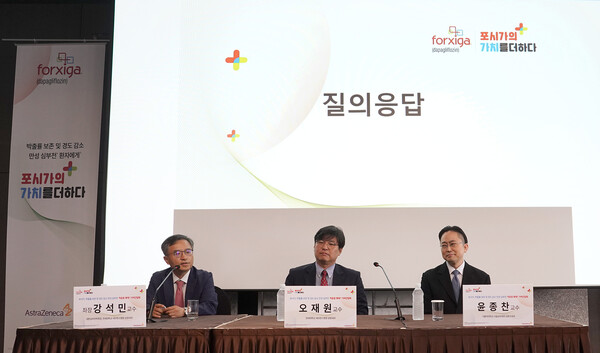Korean cardiologists emphasized the need to reimburse AstraZeneca’s SGLT-2 inhibitor Forxiga in treating heart failure with preserved ejection fraction (HFpEF) at a press conference celebrating the indication expansion of Forxiga on Monday.

"Given the clinical benefits of Forxiga, it warrants expanded reimbursement for HFpEF," Korean Society of Heart Failure (KSHF) President Kang Seok-min said during the press conference. "The reasoning is that SGLT-2 inhibitors have become the global standard of care for chronic heart failure, and there is no reason to hesitate to expand coverage."
Even when prescribed off-label in the treatment of heart failure, Forxiga is affordable at around 20,000 won ($15.3) per month, Kang added.
"There have been limited new treatment options for patients HFpEF, so we hope that many patients will benefit from its reimbursement as soon as possible," he said.
During the conference, Professor Youn Jong-chan at St. Mary's Seoul Hospital noted that the 2022 revised heart failure guidelines, jointly released by the three major U.S. cardiology societies - the American College of Cardiology (ACC), the American Heart Association (AHA), and the Heart Failure Society of America (HFSA) - recommend SGLT-2 inhibitors such as Forxiga for the treatment of heart failure with midrange ejection fraction (HFmrEF) and HFpEF.
"The KSHF also recommends SGTL-2 inhibitors as Class 1 to reduce hospitalization or cardiovascular death due to heart failure in patients with HFpEF, with or without diabetes," Youn said. "This is an expansion from the 2021 ESC recommendation to include only patients with heart failure with reduced ejection fraction (HFrEF) and recognizes the therapeutic benefit of SGLT-2 inhibitors in chronic heart failure."
The addition of this indication is very welcome, as Forxiga's efficacy and safety profile have been confirmed in clinical studies, including patients with HFmrEF, and the guidelines are now supported.
Professor Oh Jae-won at Severance Hospital discussed Forxiga's phase 3 DELIVER study.
"The study included about half of the patients with no history of type 2 diabetes, and relatively high-risk patients, such as those who are or have been hospitalized for heart failure," Professor Oh said. "The majority of patients were on multiple medications, and those who had improved their ejection fraction to greater than 40 percent at the time of enrollment were also enrolled."
As a result, results, Forxiga reduced the risk of the composite endpoint of cardiovascular death or worsening heart failure by 18 percent compared to the placebo, he added.
Oh also said that the overall risk of worsening heart failure and cardiovascular death was 23 percent lower with Forxiga compared to placebo, and symptom assessment scores improved by an average of 2.4 points compared to placebo.
"Sub-analyses based on ejection fraction also showed consistent improvements with Forxiga in the 49 percent or less, 50-59 percent, and 60 percent or greater patient groups," he said. "The results of the DELIVER study are important for patients and real-world practice because they show that Forxiga works independently of ejection fraction and can be considered for prescription in patients with heart failure."

